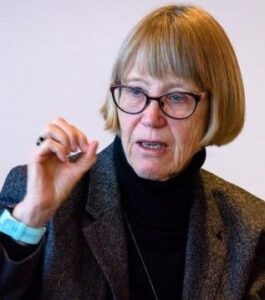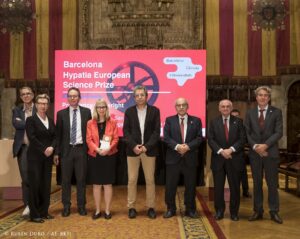Third Edition (2021)
BARCELONA HYPATIA EUROPEAN SCIENCE PRIZE
Awarded by the Barcelona City Council in collaboration with the Academia Europaea-Barcelona Knowledge Hub
THIRD EDITION: HUMANITIES AND SOCIAL SCIENCES
Philosopher Nancy Cartwright selected as winner of the 3rd edition of the Barcelona Hypatia European Science Prize for her outstanding contributions to philosophical research
 The Barcelona Hypatia European Science Prize in its third edition recognises Nancy Cartwright, philosopher of science, Professor of Philosophy at Durham University and Director of its Centre for Humanities Engaging Science and Society (CHESS), for her outstanding contributions to philosophical research. These have resulted in a new understanding of the nature of scientific theories and of causation and have held far-reaching consequences for a range of different fields of knowledge, including both natural and the social and human sciences; in particular, she has laid the foundations for an approach combining rigour and realism that aims at evidence-based policy and has had a profound impact on societies and policies across Europe and beyond.
The Barcelona Hypatia European Science Prize in its third edition recognises Nancy Cartwright, philosopher of science, Professor of Philosophy at Durham University and Director of its Centre for Humanities Engaging Science and Society (CHESS), for her outstanding contributions to philosophical research. These have resulted in a new understanding of the nature of scientific theories and of causation and have held far-reaching consequences for a range of different fields of knowledge, including both natural and the social and human sciences; in particular, she has laid the foundations for an approach combining rigour and realism that aims at evidence-based policy and has had a profound impact on societies and policies across Europe and beyond.
Launched by the Barcelona City Council in collaboration with the Academia Europaea-Barcelona Knowledge Hub (AE-BKH) within the framework of the Barcelona Science Plan, the Hypatia Prize seeks to project the city as a European capital of research and innovation. Its main goal is to spotlight science, as well as to promote, support and enhance the value of excellent research conducted in Europe and of its impact on society. The winner of the first edition of the prize, devoted to Science and Technology, was László Lovász, mathematician and professor at Eötvös Loránd University in Budapest, Hungary, for his outstanding career in the field of mathematics as a scientific discipline at the service of society; the winner of the second edition, devoted to Life and Health Sciences, was virologist Ilaria Capua, Director of the “One Health” Center of Excellence at the University of Florida, for her leadership in open access to genetic information on emerging viruses and for her promotion of the multidisciplinary concept of “one health”.
The Hypatia Prize features a monetary award of 30,000 euros and a commemorative plaque, which were handed to Cartwright during a solemn ceremony held on October 27th, in the Saló de Cent, of the Barcelona City Hall. During the ceremony, Cartwright delivered a distinguished lecture entitled, “Modelling Objectively,” in the company of Barcelona city officials, representatives from Barcelona’s scientific community and Members of Academia Europaea (AE). You can enjoy the video recording of the event theough this LINK.
The selection jury was composed of five academic members proposed by Academia Europaea and by the Barcelona City Council, as follows: Björn Wittrock (President), Professor Emeritus at Uppsala University and Founding Director and Permanent Fellow at the Swedish Collegium for Advanced Study, Sweden, who in addition serves as AE Vice-President ex officio and Chair of Class A2-Social and Related Sciences; Genoveva Martí, ICREA Research Professor at the University of Barcelona, Member of AE Class A1- Humanities and Chair of the Section devoted to Philosophy, Theology and Religious Studies; Alexander Fidora, ICREA Research Professor at the Universitat Autònoma de Barcelona and Member of the AE Class A1-Humanities; Maria Dolors Garcia-Ramon, Professor Emeritus at the Universitat Autònoma de Barcelona and Member of AE Class A2-Social and Related Sciences; and Ricard Guerrero (Secretary), Academic Director of AE-BKH.
From the fifteen candidates nominated in the area of the prize in its second edition, fourteen of whom were validated for compliance with the prize terms and conditions, Cartwright, deemed “one of the most influential, if not the most influential, contemporary philosopher of science,” was chosen by the members of the selection jury as winner. Their decision was motivated by her philosophical research career conducted at the highest international level, by the influence that her work, “characterised by analytical clarity and scholarly rigour,” has had on a variety of fields, including both the natural and the social and human sciences, and by the social impact made through her contributions toward improving evidence-based policy across Europe and beyond.
Prize winner Nancy Cartwright
 Nancy Cartwright is a methodologist and philosopher of science, focusing in the first part of her career on the philosophy of physics, and the latter part on the social and economic sciences, with special attention to causation, evidence and modelling. Her recent research has dealt with scientific evidence, objectivity and how to put scientific knowledge to work, especially for improving policy deliberation, such as in the project ‘Knowledge for Use’ [K4U]. She has worked with others on projects in this area on education, child protection and international development. Holding appointments in both the United Kingdom and the United States, she currently is Professor of Philosophy at Durham University and Distinguished Professor at the University of California San Diego, having worked previously at Stanford University and the London School of Economics.
Nancy Cartwright is a methodologist and philosopher of science, focusing in the first part of her career on the philosophy of physics, and the latter part on the social and economic sciences, with special attention to causation, evidence and modelling. Her recent research has dealt with scientific evidence, objectivity and how to put scientific knowledge to work, especially for improving policy deliberation, such as in the project ‘Knowledge for Use’ [K4U]. She has worked with others on projects in this area on education, child protection and international development. Holding appointments in both the United Kingdom and the United States, she currently is Professor of Philosophy at Durham University and Distinguished Professor at the University of California San Diego, having worked previously at Stanford University and the London School of Economics.
Cartwright is a former MacArthur fellow, a fellow of the British Academy and of the (U.K.) Academy of Social Sciences, a member of Academia Europaea, of the American Academy of Arts and Sciences, of the American Philosophical Society -the oldest learned society in the United States- and of the Leopoldina, or German National Academy of Sciences. She is the recipient of the Carl Gustav Hempel Prize for 2018, recognising lifetime scholarly achievement in the philosophy of science, and of the 2017 Dr. Martin R. Lebowitz and Eve Lewellis Lebowitz Prize, alongside Elliott Sober, awarded by the Phi Beta Kappa Society in conjunction with the American Philosophical Association. In addition to her appointments in Durham and San Diego, she is Tsing Hua Honorary Distinguished Chair Professor at the National Tsing Hua University in Taiwan, and Visiting Professor at the University of Johannesburg Institute for the Future of Knowledge. She has been awarded honorary doctorates by the University of St Andrews and by Southern Methodist University.
Cartwright has engaged in a large number of interdisciplinary projects over the course of her career and has written or co-authored numerous books, the most recent of which are: The Tangle of Science: Reliability beyond Method, Rigour and Objectivity [with Jeremy Hardie, Eleonora Montuschi, Matthew Soleiman and Ann Thresher, forthcoming OUP] and A Philosopher Looks at Science (forthcoming CUP); Nature the Artful Modeler: Lectures on Laws, Science, How Nature Arranges the World, and How We Can Arrange It Better (2019), Improving Child Safety: deliberation, judgement and empirical research [with E Munro, J Hardie & E Montuschi] (2017), Evidence: For Policy and Wheresoever Rigor is a Must (2013), and Evidence Based Policy: A Practical Guide to Doing it Better [with J Hardie] (2012). She has also co-edited three collections: Rethinking Order: After the Laws of Nature [with K Ward] (2016), Philosophy of Social Science: A New Introduction [with Eleonora Montuschi] (2014), and Idealization XII: Correcting the Models. Idealization and Abstraction in the Sciences [with M R Jones] (2005).
The Barcelona Hypatia European Science Prize, part of the Barcelona Science Plan
The Barcelona Hypatia European Science Prize is part of the Barcelona Science Plan 2020-2023, a comprehensive science policy with the aim of projecting Barcelona as a European capital of science and innovation. The Prize aims to recognise an outstanding scientist or researcher who has conducted her/his career in Europe at the highest international level and has had a strong influence on different fields of knowledge and a positive impact on society.
The Hypatia Prize is awarded annually and follows a triennial cycle, rotating each year among three major areas of knowledge:
● Science and Technology
● Life and Health Sciences
● Humanities and Social Sciences
The call for candidates is aimed at scientists and researchers who have carried out their research in a European country, having achieved a career of excellence at the highest international level, a positive influence on society and social well-being, and impact on different fields of knowledge. Nominations must be made by Members of Academia Europaea.
The name of the Prize honours Hypatia of Alexandria (344-415), a woman scientist and philosopher who successfully bridged and disseminated all scholarly disciplines known during her time and who, for this same reason, was assassinated by the forces of ignorance and fanaticism.
The Hypatia Prize constitutes one of the main features of the Barcelona Science Plan, a strategic initiative of the Barcelona City Council to promote the science and research infrastructures of the city, involving joint efforts by the scientific, academic, business and community sectors.
For more information contact AEbarcelona@fundaciorecerca.cat
